#abolish the school system
Explore tagged Tumblr posts
Text
AI is the first step to abolishing the education system as it is and I am all for it.
Of course AI has its issues but I'd rather have AI than the school system they try to sell as education.
School shouldnt be about competition but about teamwork. School shouldnt be about teaching every single kid the exact same shit and expecting them to be good at it while ignoring where their strengths and weaknesses lie and then telling them theyre dumb if they cant learn something. Grades in general should be abolished. Homework should be abolished. Like, why is it a bad work life balance to work overtime after a 9 to 5 but homework is okay? Dress codes should be abolished. Sports, Music and Art should be optional. A school subject about economics should be established to educate about stock markets, pyramide scemes, taxes, how to find a job, how to find an appartment, inflation etc. High school teachers should stop scaring children about the future and instead help them.
We as a society decided that the better an animal can follow your commands, the smarter it is (dogs, dolphins etc.) and use the same logic with kids. Look at octopuses or ravens. They are a part of the most intelligent creatures in the world but we are indoctrinated from a young age that following commands equals being succesful. And then the older generation is confused why its so hard for us to be independand or make choices for ourselfes.
Maybe AI can show the world that by treating us like mashines that have to give a specific output to get good grades, we will never truly learn because we do not need to be ChatGPT. Thats not how children should be teached.
0 notes
Text
Them: If we abolish the Department of Education how will children learn?
Me: Easy, give education funding back to the states and parents. The Department of Education has proven it can't manage money or help students succeed.
#Education#Department of Education#Schooling#Lessons#Public schools#School choice#Homeschooling#Education system#Government schools#Teaching#Students#Student achievement#Academic achievement#Politics#News#Op-ed#Abolish the department of education
4 notes
·
View notes
Text
Someone needs to explain to Canadian Catholics that a truly oppressed and marginalized religious group would not have their own publicly funded school system that is such a normalized part of society that few people ever really truly question its existence.
#Canada’s catholic school system needs to be abolished fr#Like THAT right there is privilege#Having your own school system with a curriculum that centres around YOUR religion is privilege#ex catholic#Having the catholic school system was a part of the compromise to get Quebec to join Canada back in ye olden times#Like catholics are the majority among Christians in this country and they’re one of the largest religious groups here#You’re not fucking oppressed for being catholic IN CANADA#Fuck off
38 notes
·
View notes
Text
the way my page has regressed to me just trying to keep up with my moots — i am sooo tired rn n just trying to make sure everyone else is doing well <33
#that’s why this will never just be a writing blog istg#i have so many drafts in my notes n no motivation to any of them#i pulled an all nighter yesterday jusy for my test today n ended up feeling so dizzy at school that i had to leave BEFORE THE TEST#ya i’m upset but it’s okay i emailed my teacher n now i get more time to study !!#but i crashed as soon as i got home n just woke up from a 10 hour nap#i needed that sooo badly cause i am so burnt out rn istg if the school system doesn’t just abolish itself#anyway i hope everyone else is doing well n good — even if i’m not super active on here i wanted to keep up with moots#don’t forget me !!#i’ll be more active once i’m less tired i swear#꒰ soon you'll get better. ꒱
7 notes
·
View notes
Text
I don't think that kids should be exclusively homeschooled, but I also don't think that kids should be going to a building with hundreds of people 5 days a week during a pandemic. It's one of the main reasons why it keeps spreading so rapidly and won't go away. They don't take any preventative measures at schools anymore (at least not around here). You got kids? You're getting sick. Your coworker has kids? You're getting sick.
Schools are back to counting attendance. You can't even keep your kid home long enough to recover from covid before sending them back. They literally send a "truancy" (police) officer to your house if you keep them home too often.
I feel like we could be doing something better. I'm not entirely sure what the solution is. But this isn't it.
#.bdo#I tried homeschooling 3 kids at the beginning of the pandemic my ADHD is way too bad for that#this doesn't even touch on how I think the modern public school system needs to be abolished and rebuilt#the kids don't get enough breaks bullying isn't properly addressed the history they teach them is biased and/or outdated#attendance policies are ableist and classist and a fuck#PE shouldn't be something you're graded on and exercises should be given based on the individual child's abilities and needs#there should be more counselors and actual child psychologists in the building#school breakfast and lunches should always be free for every kid (thankfully they started doing that here in my town a year ago)#there should be different times of the day you can drop your kid off instead of one set starting time and one ending time#to work with different people's work and sleeping schedules#kids should not be required to be at school before 9 am but we have schools starting between 6:50am-7:20am now#my school years would have been 10000% easier if I could have started at 11am instead#kids need to be met at their level instead of forcing the same curriculum on everyone#MORE TEACHERS! More than one per classroom! Why are we making one person watch 30 kids at once!#this needs to be a whole separate post but I needed to get this rant out now
4 notes
·
View notes
Text
People like to make fun of YA worldbuilding tropes that sort teenagers into arbitrary categories based on arbitrary characteristics that nonetheless have a huge impact on the teenager's future.
This is not unrealistic however, because the german education system sorts 4th graders based on their "academic merit" as determinded by one of their elementary school teachers into one of three (sometimes four) further type of schools, which has a drastic impact on the likelihood of you even getting the qualification to attend university.
Yes, your entire academic career path is dependent on whether your elementary school teacher likes you or not. Don't worry, some states think that's bullshit too and instead make fourth graders sit entrance exams for the education level of their (parents') choice. (Although the teachers still get a say). That's why sometimes have news articles about the burn out rates of elementary schoolchildren in Bavaria.
But don't worry! Politicians love to complain about... to many people in recent years receiving the qualification to attend university...
#but don't worry! of course there's educational class mobility!#if your grades are good enough you too can give up your entire social life to attend a different school form#where a good chunk of the teacher's are convinced that your presence in their classroom is an indicator of the descent of the country#this works in both directions too! if your grades are bad enough the school can always send you to a different form#this is totally not discrimination because this is all to support the child's individual learning needs in an environment fit for them#<- unironic official reasoning for why this system still exists#some parties have adressed the inherent discrimination and added a fourth school form in some states to mix things up#(after a former fourth form was abolished - i think nationwide?)#or i guess you go to private school#secret fifth option#germany#just german things#educational system#ya#worldbuilding#politics#i love every time the question on why so few people from working class families attend university in germany crops up at uni#everyone answers financial feasability despite numerous opportunities for financial aid#and overlooks *because you filter their asses out in elementary school*
5 notes
·
View notes
Text
Classism in Private School
The thing about going to a private school is that people will be openly classist and it will be very normalised, but when you complain about it or try to own a conversation about it, that gets heavy resistance.
If someone outright says something like "I hate the poor" or "those people are povvos why should I care about them?" Those will get pushback. But snide jokes, mocking accents, othering people, talking about state kids behind their backs, telling people to "collect their benefits" and that "state school children are [negative adjectives]" is completely okay and goes under the radar.
But if someone makes the mistake of complaining about it and labelling it what it is (classism), they get are the point of focus and heavy resistance, not the actual classist behaviour at hand. People will be like "oh it's just a few bad apples" or "woah classist is a strong word!" But they'll never address the person who said lower class people do not deserve access to the arts, or the boy who said "go on get your benefits", or the girls pointing and gawking at state school children, or the people mocking your accent even though you're currently code switched.
It is so weird. The state kids who have just joined all allow it to go under the radar too. I wonder if this is a thing of self protection, them thinking they are better than those who stayed at state school, thinking that it will not come to them or doesn't already. It's really weird.
#classism in private school#neometrocosmos#classism#British class system#communism#private school#abolish privatised education
1 note
·
View note
Text

#public school#education system#fuck capitalism#capitalism kills#we live in hell#socialism now#abolish capitalism#peoples union
0 notes
Text
The Best News of Last Month
Sorry for being not active this month as I had some health problems. I'll start posting weekly now :) Meanwhile here's some good from last month
1. Widow donates $1 billion to medical school, giving free tuition forever
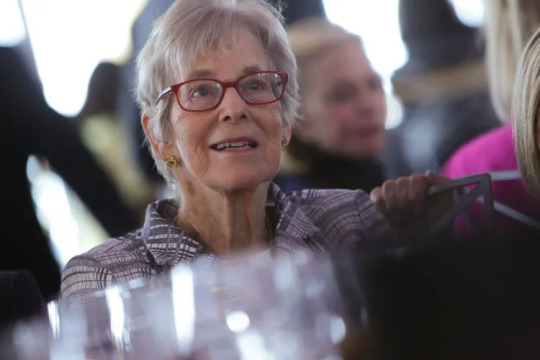
Ruth Gottesman surprised by her late husband's $1 billion in Berkshire stock, decides to donate it in full to the Albert Einstein College of Medicine in the Bronx, New York City's poorest borough. The donation is intended to cover students' tuition indefinitely, ensuring access to medical education for generations.
A video capturing students' emotional reactions to the news, cheering and crying, circulated after the announcement, highlighting the profound impact of the donation on the medical school community.
2. Electric school buses outperform diesel in extreme cold
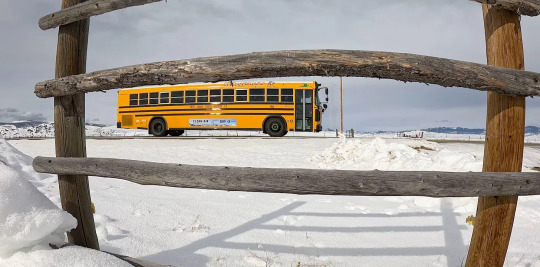
In Colorado's West Grand School District, electric school buses outperformed their diesel counterparts, particularly in the bitterly cold temperatures of towns like Kremmling, where morning temperatures can drop below -30 degrees Fahrenheit. Despite common concerns about reduced range in extreme weather, the electric buses maintained their battery charge even in these frigid conditions, providing reliable transportation for students.
This success has been welcomed by the school district, as diesel vehicles also face challenges in starting in Colorado's harsh winter weather.
3. Christian Bale unveils plans to build 12 foster homes in California
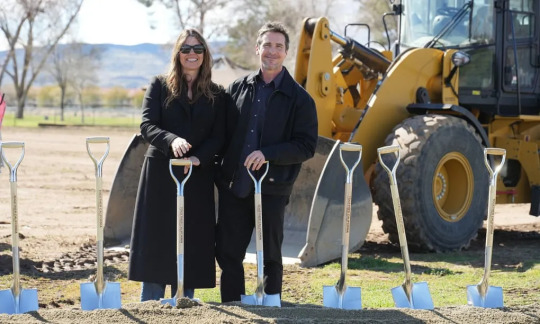
Christian Bale has led a tour round the new village in California where he plans to build 12 foster homes, as well as two studio flats to help children transition into independent living, and a 7,000 sq ft community centre.
The actor has spearheaded the building of a unique complex of facilities with the aim of keeping siblings in the foster care system together, and ideally under the same roof.
4. Average lifespan of a person with Down syndrome has increased from 25 years in 1983 to 60 years today
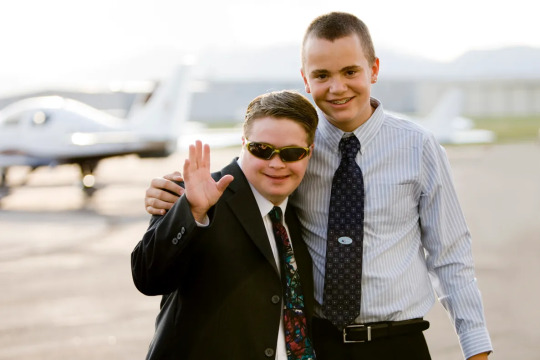
Today the average lifespan of a person with Down syndrome is approximately 60 years.
As recently as 1983, the average lifespan of a person with Down syndrome was 25 years. The dramatic increase to 60 years is largely due to the end of the inhumane practice of institutionalizing people with Down syndrome.
5. Greece legalises same-sex marriage
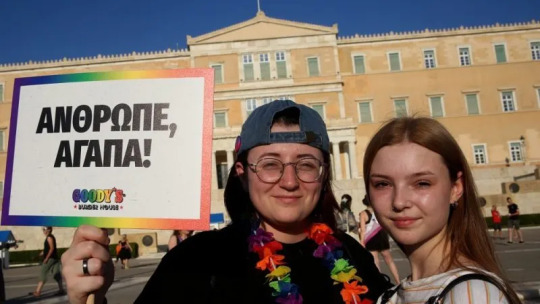
Greece has become the first Christian Orthodox-majority country to legalise same-sex marriage. Same-sex couples will now also be legally allowed to adopt children after Thursday's 176-76 vote in parliament.
Prime Minister Kyriakos Mitsotakis said the new law would "boldly abolish a serious inequality".
6. Massachusetts police K9 tracks scent for over 2 miles to find missing 12-year-old in freezing cold

A Massachusetts police K9 followed her nose to help find a 12-year-old who went missing in frigid temperatures last week, tracking the child’s scent for over two miles, authorities said.
K9 Biza, a female German shepherd, was called on to help after officers learned the child left their home at around 10:30 p.m. Wednesday and was last seen in the Pakachoag Hill area of Auburn, the Auburn Police Department said.
7. Good News for the Socially Anxious: People Like You a Lot More Than You Think They Do, New Research Confirms

The "Lake Wobegon effect" or "illusory superiority" phenomenon highlights people's tendency to overestimate their abilities, but recent research suggests that in social interactions, individuals often underestimate their likability and charm.
Studies indicate that people consistently fail to recognize signals of others' liking toward them, leading to a "liking gap" where individuals believe they are less likable than they actually are.
Techniques such as focusing more on others during conversations and genuinely expressing interest in them can help alleviate social anxiety by shifting the focus away from self-criticism. Ultimately, understanding that others may also experience similar anxieties can lead to a more relaxed and enjoyable social experience.
---
That's it for this week :)
This newsletter will always be free. If you liked this post you can support me with a small kofi donation here:
Buy me a coffee ❤️
Also don’t forget to reblog this post with your friends.
3K notes
·
View notes
Note
Is there a story behind China's one child policy that makes it not as horrifying as western media claims?
The defining feature of China's development for the past 70 years has been the urban-rural divide. In order to develop a semi-feudal country with a very low industrial level into an industrialised, socialist nation, it was necessary to develop industrial centres. To 'organically' develop industrial centres would have taken many decades, if not centuries of continued impoverishment and starvation, so programs were put in place to accelerate the development of industry by preferentially supporting cities.
Programs like the 'urban-rural price scissors' placed price controls on agricultural products, which made food affordable for city-dwellers, at the direct expense of reducing the income of rural, agricultural areas. This hits on the heart of the issue - to preferentially develop industrial centres in order to support the rest of the country, the rest of the country must first take up the burden of supporting those centres. Either some get out of poverty *first*, or nobody gets out of poverty at all. The result being: a divide between urban and rural areas in their quality of life and prospects. In order to keep this system from falling apart, several other policies were needed to support it, such as the Hukou system, which controlled immigration within the country. The Hukou system differentiated between rural and urban residents, and restricted immigration to urban areas - because, given the urban-rural divide, everyone would rather just try to move to the cities, leaving the agricultural industry to collapse. The Hukou system (alongside being a piece in many other problems, like the 'one country two systems', etc) prevented this, and prevented the entire thing from collapsing. The 'one child policy' was another system supporting this mode of development. It applied principally to city-dwellers, to prevent the populations of cities expanding beyond the limited size the agricultural regions could support, and generally had no 'punishments' greater than a lack of government child-support, or even a fine, for those who still wanted additional children. Ethnic minorities, and rural residents, were granted additional children, with rural ethnic minorities getting double. It wasn't something anyone would love, but it served an important purpose.
I use the past-tense, here, because these systems have either already been phased out or are in the process of being phased out. The method of urban-rural price scissors as a method of development ran its course, and, ultimately, was exhausted - the negative aspects, of its underdevelopment of rural regions, began to overwhelm its positive aspects. So, it was replaced with the paradigm of 'Reform and Opening Up' around the 1980s. Urban-rural price scissors were removed (leading to protests by urban workers and intellectuals in the late '80s), and the Hukou system, along with the 'one child policy', were and are being slowly eased out as lessening inequality between the urban and rural areas make them unnecessary. Under the new system, the driver of development was no longer at the expense of rural regions, but was carried out through the internal market and external capital. The development paradigm of Reform and Opening Up worked to resolved some contradictions, in the form of the urban-rural divide, and created some of its own, in the form of internal wealth divisions within the cities. Through it, over 800 million people were lifted out of extreme poverty - almost all of them being in rural areas - and extreme poverty was completely abolished within China. 'Extreme poverty' can be a difficult thing for westerners to grasp, wherein poverty means not paying rent on time, but to illustrate - many of the last holdout regions of extreme poverty were originally guerrilla base areas, impassable regions of mountainside which were long hikes away from schools or hospitals, wherein entire villages were living in conditions not dissimilar to their feudal state a century before. These villages were, when possible, given infrastructure and a meaningful local industry accounting their environment and tradition (like growing a certain type of mountainous fruit), or entirely relocated to free government-built housing lower down the mountain that was theirs to own. These were the people the 'one child policy' was aiding, by reducing the urban population they had to support. Again, there were exemptions for rural and ethnic minority populations to the policy.
Even now, Reform and Opening Up is running its course. Its own negative aspects, such as urban wealth inequality, are beginning to overcome its positive aspects. So, the new paradigm is 'Common Prosperity', which will work to resolve the past system's contradictions, and surely introduce its own contradictions in the form of chafing against the national bourgeoisie, as it increases state control and ownership of industry, and furthers a reintroduced collectivisation. Organising a nation of well over a billion people is not simple. It is not done based on soundbytes and on picking apart policies in the abstract for how 'dystopian' they sound. It is an exceedingly complex and interconnected process based on a dialectical, material analysis of things; not a utopian, idealist one. What matters is this: those 800,000,000 people now freed from absolute poverty. The things necessary to achieve that were, unquestionably, good things - because they achieved that. They had their negative aspects, as does everything that exists, but they were unquestionably correct and progressive things.
1K notes
·
View notes
Text
tbc the shirtless men arent the issue i love a good shirtless man. the school library is the problem
sickening that when im at home my dash is all pretty art & when im in the school library its shirtless men 😕
30 notes
·
View notes
Text
n childhood, I was taught the importance of seeing Black faces in government positions and political power. At school, I learned how integral specific Black political leaders were to the Black Revolution—especially during the Reconstruction era and the Civil Rights Movement. I understood from a young age that the presence of Black faces in political institutions was necessary for community advancement.
I still remember learning about Hiram Revels, who in 1870 became the first Black elected official to serve in Congress. This was shortly after slavery was abolished, and Revels’ presence in U.S. politics was a watershed moment for Black American communities.
Our presence in these institutions that sought to exclude us did indeed make a difference. Now, even after witnessing the election of a Black president in 2008 and seeing more and more Black people in spaces of political power and privilege, I’m not so sure.
When Barack Obama became president in 2008, I remember the joy felt across my community and this understanding that if a Black person could reach the highest level of power in the U.S., change had certainly come.
That was the beginning of a harsh reality check for me. What good is Black political representation in a system meant to maintain the subjugation of marginalized people? What positive change does that representation bring when people with Black faces are complicit in the same oppression and violence that continue to devastate communities like ours?
Communities like Gaza, whose devastation we continue to see every day.
The death toll in Gaza is more than 37,000, and the U.S. has repeatedly vetoed a life-saving ceasefire for the Palestinian people and voted against the effort to recognize Palestinian statehood.
The U.S. has left Palestine and its people in the path of fire and destruction. The world has watched the U.S. ambassadors for the United Nations silently raise their hands to veto ceasefire resolutions. Their silence speaks volumes.
U.N. ambassadors Linda Thomas-Greenfield and Robert A. Wood are Black Americans in high-ranking government positions, two Black Americans who ostensibly represent our ability to overcome a history of slavery, genocide, and racism, the relics of which continue to plague our communities today. They are two Black Americans choosing to subject another group of oppressed people to genocide and displacement, not so different from what our ancestors faced when they were stolen from their lands, slaughtered, and enslaved.
Before you assume otherwise, let me say that I do understand nuance. Yes, Ambassadors Thomas-Greenfield and Wood do carry out Washington’s decisions, and they do not act on their own behalf; they are the voice of the U.S. government. But for me, the question remains: Why are you there? As Black Americans, why are you choosing to work as conduits for colonization, imperialism, and genocide? What does this do for Black people in America right now? Because existing in places of power and privilege does not inherently equate to uplifting and serving the Black community.
Another example is White House Press Secretary Karine Jean-Pierre. The daughter of Haitian immigrants, Jean-Pierre is the first Black and openly gay woman to hold her role in the White House. She is a Black woman I once looked up to—until I began to pay close attention to the way she speaks of Israel’s war on Gaza.
In one press conference, Jean-Pierre could not even acknowledge why Palestinian, Muslim, and Arab organizations rejected meetings with President Joe Biden. I’ve watched Jean-Pierre dismiss journalists’ questions regarding the safety and protection of Palestinians in Gaza. Of course, Jean-Pierre is the White House’s mouthpiece, and we do not know her thoughts on the genocide in Palestine. But again, I ask: Why is she there? What is she willing to co-sign to have proximity to power? What personal excuses are used to justify being complicit in oppression not so different from what our own people face?
How many times will we exempt Black political figures from accountability while holding up their representation as some sort of community good? Do we not realize the harm this does when we uplift Black leaders who merely act as conduits for white supremacy? As a Black woman, I find this hard to accept.
more at link
641 notes
·
View notes
Text
I think we all know on some level that age is a pretty blunt instrument for measuring maturity and capability. We all develop at different rates and in different ways, especially when you take into account environmental factors as well as disability. I said my first words at six months old and didn’t get comfortable walking until I was two. Both of those are developmentally ‘abnormal,’ but in completely opposite directions. Intellectually, I was able to spar with most adults before I was old enough to drive a car, but at age 36 I still cannot handle cooking dinner or doing my taxes. (I also really shouldn’t be trusted behind the wheel of an automobile, if I’m being real).
Research suggests that many Autistic people develop social and emotional skills at a slower pace than most non-Autistics; in our 40s, 50s, and beyond we are still learning a lot of valuable lessons about how to better relate to people, and show less difficulty in our relationships as time goes on. I didn’t learn how to make friends or name my emotions until my 30s — was I not an adult until then? What skills must a person have to qualify as really, fully an adult?
This points to a major problem in how our current systems look at intellectually disabled people — their abilities and needs are often summarized using the confusing metaphor of “mental age.” A person with Down Syndrome who cannot read or use the toilet might be labelled as “mentally three-years-old,” for instance — but what does it mean to be mentally three? Which kind of imagined three-year-old is setting that standard? Which skills are important to determine someone’s mental “age”? If a person can write fluently using an adaptive communication device but can’t tell when they need a shower, what mental age do we give them — and which rights?
Why does ability level determine the rights that a person has, anyway?
In our current society, people considered “children” receive certain resources that nobody else gets, like free schooling and special state-provided health insurance, and if they do not have a guardian they are assigned one. A legal adult gets to make all legal, medical, and educational decisions for the child, and makes sure they remain housed and fed.
There are many adults who could use this kind of support. But relying upon others for such support means you don’t get the rights of a legal adult, according to the Support-Freedom Dichotomy. If an intellectually disabled person can’t understand complicated legal and financial documents, for instance, they’re likely to be placed under a conservatorship and lose the freedom to buy the things they like or live how they want to live. They do have preferences and insight into their own lives, but because they need help carrying those preferences out, they don’t get to make them.
I propose that rather than equating needing support with losing freedom, and instead of trying to define a simple category of people who does not get to be an “adult,” we ask specific questions about people’s needs, capabilities, preferences, and desires in a way that allows for everyone to get both the help and the autonomy they require.
I wrote about abolishing age as a meaningful way of categorizing what rights a person gets -- and what supports they are entitled to. You can read the full piece for free on my substack.
127 notes
·
View notes
Text
i am not sure how to phrase this, and i am certain nothing i can say will even breach the depth of what this election means and how difficult it has been to follow.
the closer the election comes the more anxious i am becoming.
there are less than two weeks to go, and the reality of trump becoming president again feels more and more real. this is the man who told people to take horse tranquilizers during an world wide pandemic that killed millions. this is the man who has been accused of rape multiple times. this is the man who said pregnant people should be arrested for abortions. this is the man who said they are performing transgender surgeries in schools. this is the man who said shit hole counties. this is the man who threw paper towels to puerto ricans after hurricane maria destroyed the island. this is the man who called men of color rapists and criminals. this is the man who said he wants to be a dictator. this is the man who promised to finish the job of a genocide.
make no mistake that i believe kamala harris is a bad person. i do not care that she is a woman. i do not care that she is a person of color. those things do not change the fact that she is a bad person. she is not a tv character we can stan, she is not a celebrity to have a parasocial relationship with.
her stance on israel is sickening, and i do not feel proud to vote for her. but she is the only person standing between trump and dictatorship.
i do believe the people of the united states can someday challenge the broken two party system, i believe we can abolish the two party system. not in two weeks.
not voting, or voting third party, in my opinion, is not using your voice for good. a trump re-election will be catastrophic for the entire world. he will be able to choose more right wing supreme court justices.
under a kamala harris presidency we can make steps forward to press democrats in congress to do better, we can push her to make decisions we want her to as a public servant - because she may not be the best leader but she is not a dictator.
i understand the quesy feeling of this election. i understand not being proud of voting. this is not a movie where we ride off into a sunset knowing that if harris wins the world will be at peace. that is wrong. it's terrible. but i believe in the duty of making sure we use all of our power to keep pain and suffering to a minimum with the cards that have in our hands in the present moment so we can have better choice and outcomes in the future.
please, for the love of god, vote for kamala harris. we cannot more forward by going backward. we cannot stand by the door when there is an armed shooter on the other side. we have to block the way.
151 notes
·
View notes
Text
The Charleston Church Shooting: Dylann Roof

*NOTE! This is a repost! And it will look familiar CAUSE IVE POSTED IT ON ANOTHER ACCOUNT!! Is it the best? No.*
—
Early life/ Prior convictions
Dylann was born April 3rd 1994 to mother Amelia and father Franklin with 2 sisters Amber and Morgan. During early childhood his parents would divorce and his father would later remarry. His stepmother accused his father of abuse. He would beg his step mother to let him live with her but she wasn’t able to. Dylann would be described to have obsessive compulsive tendencies with germs. In middle school he would stop caring about school and started smoking weed and drinking vodka. In nine years he would have attended seven schools. In 2010 he would drop out of Highschool and continue playing video games and smoking weed and drinking.

(The Roofs home)
In 2015 he was caught with an invalid prescription for suboxone at a mall to which he was banned from for a year. Later that year he was caught loitering in the mall to which they searched his car finding a forearm grip for a AR-15 semiautomatic rifle and six unloaded magazines capable of holding 40 rounds each but was let off it was legal in the state. Roofs Suboxone charge was mishandled and a system error took it as a misdemeanour instead of a felony. Which would have possibly prohibited him from purchasing the firearm.

(The flag of Rhodesia)
Later Dylann would look into the Trayvon Martin case and from an unknown article concluded Zimmerman was in the right. He then fell down a rabbit hole of black on white crime and misinformation. He then found 4chan and would find even more misinformation and hard right ideologies Dylann states he hasn’t been the same since that day. Which leads to his manifesto titled ‘The last Rhodesian’ Rhodesia being the African state founded in 1965 ran by primary Europeans and a white supremacy ideology before being abolished in 1979. The term now sticks with white supremac!sts like Dylann had became, as he also used the flag on his jacket. In preparation before the attack he looked up black churches and found the Emanuel Methodist Episcopal Church and would scout the area and ask around about mass times.
The shooting
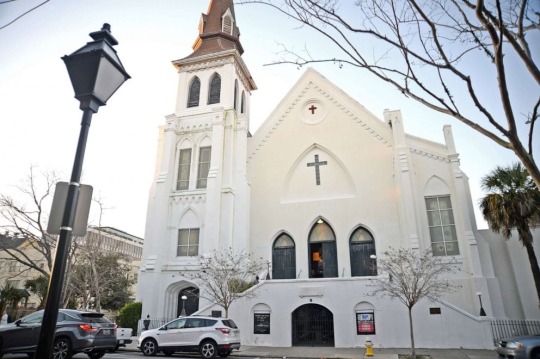
(The Emanuel Methodist Episcopal Church)
June 15th 2015 somewhere around 8:00pm Dylann entered the church, once he did he was greeted by Rev.Pinckney and given a bible to study with. Roof was sat next to Pinckney as the study continued. As the study closed and the ending pray started Roof stood up and pulled out his Glock 41 .45 calibre handgun and began shooting. Killing Pinckney first. Then 26 year old Tywanza Sanders stood up to plead with Dylann before he said ‘I have to do it. You rape our women and you’re taking over our country and you have to go’ he then shot and k!lled Sharonda Singleton, Dr. Daniel L. Simmons, Ethel Lee Lance, Cynthia Hurd, Myra Tompson and Tywanza Sanders. Dylann would reload 5 times that day. Polly Shepherd was spared when he asked her if he shot her yet to which she replied no he then told her ‘good cause we need someone to survive because I’m gonna shoot myself and you’ll be the only survivor. He then turned the gun on himself realizing he was out of ammo. He then left the church to the surprise there wasn’t anyone outside. The next day the police confirmed the gunman was 21 year old Dylann Roof with witnesses reporting they saw him drive towards Shelby, a town close to Charleston. At 10:44am Roof was arrested at a traffic stop in Shelby where it was then confirmed he worked alone.
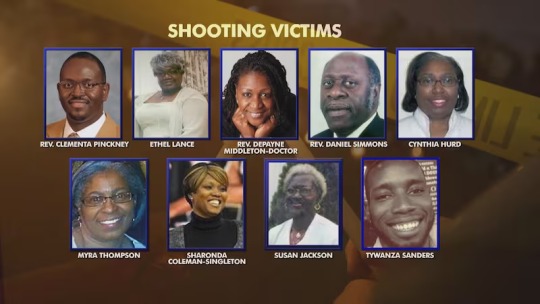
(The victims)
The Trial
Five days after the shooting the grand jury announced that Roof was being indicted for 33 federal charges.
12 counts hate crime against black people
12 counts obstructing the exercise of religion
9 counts murder using a firearm.
On June 6th Roof reportedly did not want to be trialed by jury and instead let the judge decide if he was guilty and if the death penalty was reasonable. August 23rd Roofs lawyers called the motion of death penalty unconstitutional and asked to reject the motion. On September 1st an on camera hearing was held in case of outbursts. December 7th 2016 the trial started. During a survivor statement Roofs mom collapsed as she had a heart attack. After 3 days of the trial FBI played a video on which he admitted to laughing and drinking while describing to friends how he’d shoot the church. To which his friend didn’t report to police and said he was drunk and took his keys and Glock that was on him. After 2 hours the jury found him guilty on all 33 charges. Roof wanting to plead guilty but told not to by lawyers.
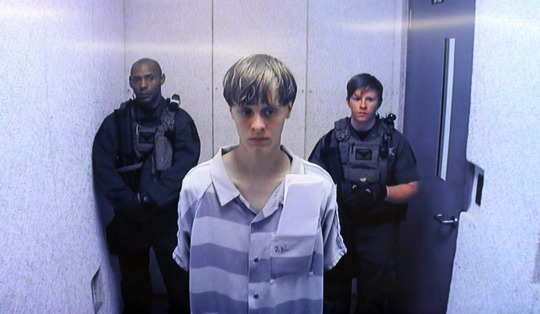
(Roof at his video hearing)
January 10th 2017 Roof was sentenced to the death penalty,death by lethal injection.
#tc community#tcc columbine#tccblr#true cringe community#tcc tumblr#dylannstormroof#info post#informative#information#eric columbine#dylan columbine#eric and dylan
197 notes
·
View notes
Text
Heather Cox Richardson 11.15.24
One of President-elect Trump’s campaign pledges was to eliminate the Department of Education. He claimed that the department pushes “woke” ideology on America’s schoolchildren and that its employees “hate our children.” He promised to “return” education to the states.
In fact, the Department of Education does not set curriculum; states and local governments do. The Department of Education collects statistics about schools to monitor student performance and promote practices based in evidence. It provides about 10% of funding for K–12 schools through federal grants of about $19.1 billion to high-poverty schools and of $15.5 billion to help cover the cost of educating students with disabilities.
It also oversees the $1.6 trillion federal student loan program, including setting the rules under which colleges and universities can participate. But what really upsets the radical right is that the Department of Education is in charge of prohibiting discrimination on the basis of race and sex in schools that get federal funding, a policy Congress set in 1975 with an act now known as the Individuals with Disabilities Education Act (IDEA). This was before Congress created the department.
The Department of Education became a stand-alone department in May 1980 under Democratic president Jimmy Carter, when Congress split the Department of Health, Education, and Welfare into two departments: the Department of Health and Human Services and the Department of Education.
A Republican-dominated Congress established the Department of Health, Education, and Welfare in 1953 under Republican president Dwight D. Eisenhower as part of a broad attempt to improve the nation���s schools and Americans’ well-being in the flourishing post–World War II economy. When the Soviet Union beat the United States into space by sending up the first Sputnik satellite in 1957, lawmakers concerned that American children were falling behind put more money and effort into educating the country’s youth, especially in math and science.
But support for federal oversight of education took a devastating hit after the Supreme Court, headed by Eisenhower appointee Chief Justice Earl Warren, declared racially segregated schools unconstitutional in the May 1954 Brown v. Board of Education decision.
Immediately, white southern lawmakers launched a campaign of what they called “massive resistance” to integration. Some Virginia counties closed their public schools. Other school districts took funds from integrated public schools and used a grant system to redistribute those funds to segregated private schools. Then, Supreme Court decisions in 1962 and 1963 that declared prayer in schools unconstitutional cemented the decision of white evangelicals to leave the public schools, convinced that public schools were leading their children to perdition.
In 1980, Republican Ronald Reagan ran on a promise to eliminate the new Department of Education.
After Reagan’s election, his secretary of education commissioned a study of the nation’s public schools, starting with the conviction that there was a “widespread public perception that something is seriously remiss in our educational system.” The resulting report, titled “A Nation at Risk,” announced that “the educational foundations of our society are presently being eroded by a rising tide of mediocrity that threatens our very future as a Nation and a people.”
Although a later study commissioned in 1990 by the Secretary of Energy found the data in the original report did not support the report’s conclusions, Reagan nonetheless used the report in his day to justify school privatization. He vowed after the report’s release that he would “continue to work in the months ahead for passage of tuition tax credits, vouchers, educational savings accounts, voluntary school prayer, and abolishing the Department of Education. Our agenda is to restore quality to education by increasing competition and by strengthening parental choice and local control.”
The rise of white evangelism and its marriage to Republican politics fed the right-wing conviction that public education no longer served “family values” and that parents had been cut out of their children’s education. Christians began to educate their children at home, believing that public schools were indoctrinating their children with secular values.
When he took office in 2017, Trump rewarded those evangelicals who had supported his candidacy by putting right-wing evangelical activist Betsy DeVos in charge of the Education Department. She called for eliminating the department—until she used its funding power to try to keep schools open during the covid pandemic—and asked for massive cuts in education spending.
Rather than funding public schools, DeVos called instead for tax money to be spent on education vouchers, which distribute tax money to parents to spend for education as they see fit. This system starves the public schools and subsidizes wealthy families whose children are already in private schools. DeVos also rolled back civil rights protections for students of color and LGBTQ+ students but increased protections for students accused of sexual assault.
In 2019, the 1619 Project, published by the New York Times Magazine on the 400th anniversary of the arrival of enslaved Africans at Jamestown in Virginia Colony, argued that the true history of the United States began in 1619, establishing the roots of the country in the enslavement of Black Americans. That, combined with the Black Lives Matter protests in 2020, prompted Trump to commission the 1776 Project, which rooted the country in its original patriotic ideals and insisted that any moments in which it had fallen away from those ideals were quickly corrected. He also moved to ban diversity training in federal agencies.
When Trump lost the 2020 election, his loyalists turned to undermining the public schools to destroy what they considered an illegitimate focus on race and gender that was corrupting children. In January 2021, Republican activists formed Moms for Liberty, which called itself a parental rights organization and began to demand the banning of LGBTQ+ books from school libraries. Right-wing activist Christopher Rufo engineered a national panic over the false idea that public school educators were teaching their students critical race theory, a theory taught as an elective in law school to explain why desegregation laws had not ended racial discrimination.
After January 2021, 44 legislatures began to consider laws to ban the teaching of critical race theory or to limit how teachers could talk about racism and sexism, saying that existing curricula caused white children to feel guilty.
When the Biden administration expanded the protections enforced by the Department of Education to include LGBTQ+ students, Trump turned to focusing on the idea that transgender students were playing high-school sports despite the restrictions on that practice in the interest of “ensuring fairness in competition or preventing sports-related injury.”
During the 2024 political campaign, Trump brought the longstanding theme of public schools as dangerous sites of indoctrination to a ridiculous conclusion, repeatedly insisting that public schools were performing gender-transition surgery on students. But that cartoonish exaggeration spoke to voters who had come to see the equal rights protected by the Department of Education as an assault on their own identity. That position leads directly to the idea of eliminating the Department of Education.
But that might not work out as right-wing Americans imagine. As Morning Joe economic analyst Steven Rattner notes, for all that Republicans embrace the attacks on public education, Republican-dominated states receive significantly more federal money for education than Democratic-dominated states do, although the Democratic states contribute significantly more tax dollars.
There is a bigger game afoot, though, than the current attack on the Department of Education. As Thomas Jefferson recognized, education is fundamental to democracy, because only educated people can accurately evaluate the governmental policies that will truly benefit them.
In 1786, Jefferson wrote to a colleague about public education: “No other sure foundation can be devised for the preservation of freedom, and happiness…. Preach, my dear Sir, a crusade against ignorance; establish and improve the law for educating the common people. Let our countrymen know that the people alone can protect us against [the evils of “kings, nobles and priests”], and that the tax which will be paid for this purpose is not more than the thousandth part of what will be paid to kings, priests and nobles who will rise up among us if we leave the people in ignorance.”
100 notes
·
View notes